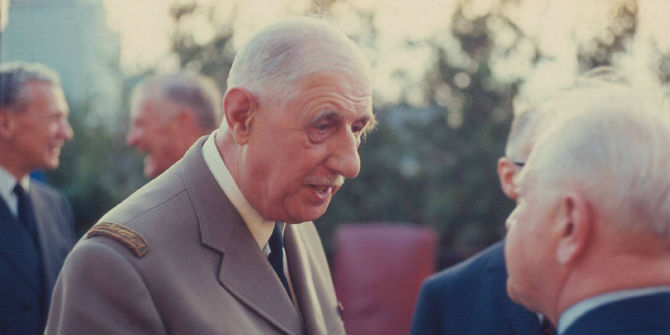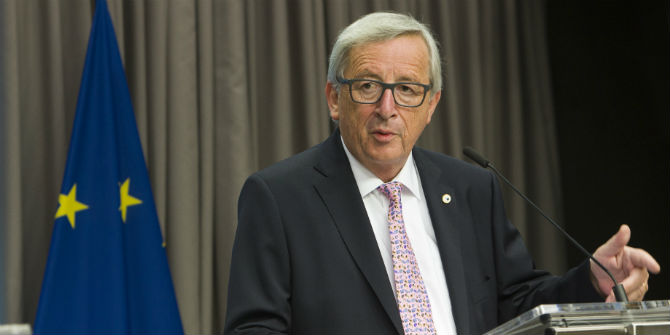 Britain is making the same mistake about the EU now as Harold Macmillan did about the European Community in the 1960s, writes Piers Ludlow (LSE). Personal appeals to Général de Gaulle proved fruitless. The EU27 are unbending – not because they bear ill-will towards the British for voting to leave, but because the nature of the EU demands internal unity. Only if the UK makes major concessions is progress likely to be made.
Britain is making the same mistake about the EU now as Harold Macmillan did about the European Community in the 1960s, writes Piers Ludlow (LSE). Personal appeals to Général de Gaulle proved fruitless. The EU27 are unbending – not because they bear ill-will towards the British for voting to leave, but because the nature of the EU demands internal unity. Only if the UK makes major concessions is progress likely to be made.
Watching the stuttering progress of the Brexit negotiations as a historian of Britain and the European integration process, I can’t help being struck by a depressing sense of familiarity. In far too many ways, we’ve been here before. And with no period are the gloom-inducing parallels more striking than with the UK’s very first attempt to join the then EEC, back in the early 1960s.
Then, as now, the negotiations began with a hopelessly optimistic assessment of how long it would take to agree membership terms. When Harold Macmillan’s government applied to join the Community in the summer of 1961, at least one newspaper confidently predicted ‘certainty by Christmas’. In fact, the outcome of the talks was still hanging in the balance when General de Gaulle intervened with the first of his famous vetoes in January 1963. If joining the comparatively new and simple Common Market of the early 1960s proved more complex and difficult than most had foreseen, how much more unrealistic are those who expected it to be easy to disentangle over 40 years of UK membership of the now much larger EU, with its vastly wider policy remit?
In 1961 Britain approached the fledgling EEC with the confident expectation that the six member states would be so glad to have the UK join them that the negotiation would involve extensive give and take on both sides. A degree of French intransigence was expected, it is true, but Macmillan and his key negotiator Edward Heath were confident that the ‘friendly Five’ – the remaining member states – would weigh into Community discussions on Britain’s behalf. Instead, the UK negotiators watched with dismay as the Six bound themselves with a negotiating procedure designed to maximise their internal unity and to minimise the extent to which the applicant could play upon differences of view within the EEC. This involved far more extensive discussions amongst themselves – negotiations about Britain, rather than with Britain – than two-way discussions with the country seeking to join. And despite repeated attempts by British diplomats and negotiators to play upon the very sincere Anglophilia (and desire for British membership) felt in most European capitals other than Paris, this unity just about held until de Gaulle’s decisive – and unilateral – intervention.

This unity amongst EEC negotiators was built around a determined defence of the Community system as it had been created, and as it might develop. Britain, as a prospective member state, would be allowed some special adaptations to smooth its path into the Community, especially with regard to the Commonwealth. But such arrangements would be temporary only, designed to lessen the shock of entry but not intended permanently to exempt the new member from any EEC rules. Britain was very welcome to join the club, in other words, but it was for the applicant to adapt its traditions, trading patterns, and global links to the Community, not vice versa. The EU27’s insistence that a departing UK should not be allowed to cherry-pick those parts of the EU’s system that it likes, and opt out of those it does not, is thus wholly in line with the stance that the founder members adopted.
This parallel is no coincidence. The determined defence of internal unity and the protection of what has been agreed amongst the members is a defining characteristic of the EC/EU as an international negotiator. Reaching agreement within the Community/Union has always been a painstaking – even painful – process. But once it has been attained, none of the members has any interest in seeing these hard-won bargains being reopened at the behest of an outsider, even one regarded as a friend. This became crystal clear to the British as they sought to join in the 1960s, culminating in the resigned acceptance by Sir Con O’Neill, the chief negotiator at official level in 1970-2, who commented that the only possible British approach to existing Community body of rules was ‘Swallow the lot, and swallow it now’.[1] But it was also a lesson learnt by the Americans during much the same period as they tried, and failed, to modify the emerging Common Agricultural Policy (CAP), and as they tangled with the Community when seeking to redefine the terms of world trade during the so-called GATT (General Agreement on Tariffs and Trade) Kennedy Round. One American diplomat of the era lamented the fact that the Community was ‘a strongly-muscled, leaden-footed beast’.[2]
But this inflexibility and unwillingness to give ground did not reflect ill-will or animosity towards either Britain or the US, any more than the EU’s current rigidity reflects a desire to punish the UK for voting to leave. It is an inevitable result of the way in which a complex multilateral entity has to prioritise the needs and desires of insiders over and above those of outsiders, however well-liked.
All of this means that flights of fancy about the Brexit impasse being broken by a well-timed deal struck between the British government and Angela Merkel and/or Emmanuel Macron are likely to be every bit as unrealistic as Macmillan’s delusional hopes that he could sort out the painfully slow Brussels negotiation by means of direct personal diplomacy towards General de Gaulle. Huge time and effort was put into the three de Gaulle-Macmillan summits of the 1961-2 period, including semi-serious contemplation of some type of nuclear deal involving aid to France’s putative nuclear deterrent in return for a smooth path in Brussels – but no real bargain was ever on the cards. Nor would Harold Wilson prove any more successful in his personal charm offensive towards de Gaulle in 1966-1967. And even Edward Heath’s seeming breakthrough with Georges Pompidou in May 1971 appears, from the latest historical research, to have been a largely stage-managed occasion, at which the two leaders made public a substantive narrowing of the gap between the French and British positions that had been largely secured by UK concessions on several key controversies on which the Heath membership talks centred.[3] No high-diplomatic shortcut is likely to allow the UK to avoid the difficult and slow negotiations in Brussels.
Instead, getting out of the EU seems likely to require the same readiness to give ground on the part of the departing country as most countries have had to display when seeking to join the EC/EU. If the UK wants a deal, it is likely to be bought through British concessions and the abandonment of some of its initial negotiating aims, rather than large-scale giveaways by the EU27. And it is here that one final parallel with the 1961-3 negotiations becomes worrying. Because just as Macmillan’s ability to make the concessions needed to reach a breakthrough in Brussels was all but destroyed by growing cabinet splits on Europe, dwindling government popularity (1962 was the year of the famous Orpington by-election) and by a Labour opposition increasingly willing to seek party-political advantage through opportunism over the European issue, so too Theresa May’s scope for flexibility seems ever more circumscribed.
The present situation, though, is much more uncomfortable and potentially painful than that of 1963. The implications of failure are far greater. Britain’s inability to join the EEC in 1963 was a hammer blow to Macmillan’s government and a disappointment to many on both sides of the Channel. But ultimately it meant no more than a temporary prolongation of the status quo, and the postponement rather than the end of the UK’s European ambitions. Failure now would be much more serious, confronting the country with all the economic, legal and political consequences of a cliff-edge Brexit. The British government urgently needs to stop repeating the mistakes of its predecessor over half a century ago. A breakthrough in Brussels is a national necessity – even if achieving it requires awkward and painful climbdowns.
References
[1] David Hannay (ed.), Britain’s Entry into the European Community. Report on the Negotiations of 1970-1972 by Sir Con O’Neill (London: Frank Cass, 2000), p.40
[2] Robert Schaetzel, cited by Dimitri Grygowski, ‘Les Etats-Unis et l’unification monétaire de l’Europe, 1968-1998’, unpublished PhD, Université de Cergy-Pontoise, 2006, p.83.
[3] Daniel Furby, ‘The Revival and Success of Britain’s Second Application for Membership of the European Community, 1968-71’. Unpublished PhD, Queen Mary, University of London 2009.
This post represents the views of the author and not those of the Brexit blog, nor the LSE.







A very level headed opinion. If someone in government had the same level of insight we’d be in a wholly different place.
Fine article. Can’t help but feel it inadvertently makes the case for a clean break with Brussels, however. Who wants to be shackled to a completely intransigent “leaden-footed beast”?
British desire for sovereign independence is understandable but naive. British industries are so integrated with the EU, that a radical disengagement would cause immediate and lasting traumatic dislocation in almost every part of society. The British Aerospace and automotive manufacturing industries are fully integrated with the EU. What about Airbus? British car manufacturing collapsed in the 70s and has been rebuilt by German, American and Japanese investment, not in British companies but by foreign companies building factories in Britain.
Already dangerously ill patients in British hospitals are suffering because French, German and other EU nurses have been leaving. The hostility to foreigners in England makes them feel unwelcome. Britain needs foreign workers to harvest crops, nurse sick people, and perform many other essential tasks. Brexit leaders say productive foreigners are needed but the emotional nationalism in England makes good foreign people want to get out and who can blame them. I have British friends living in Germany. When they visited England recently in their German registered car, they were abused and called Nazis, even when they spoke with an English accent. The toxic nationalism rising up in England today is dangerous and destructive.
I wholly concur.
Everything hinges on the key issue of how bad is ‘Hard Brexit’ the author above characterizes it as “cliff-edge”, from which I surmise he belongs to the camp that thinks such an outcome must be avoided at all costs.
Others are more sanguine and feel that while a deal is desirable, leaving without one is not as serious as many imagine.
How we approach the negotiations is predicated on a view on this point. If we can’t leave without a deal then we must give ground early and promise payments etc. If we hold out for concessions on their part we are likely to be disappointed. On the other hand if leaving without a deal is survivable then we have the whip hand after all. They want (and need) our money both in terms of subscriptions for the EU budgets and to buy their goods and services (we have a large deficit with the EU), the onus will be on them to make accommodations.
I rather feel that we are being outwitted and the EU, aided and abetted by the BBC and Guardian, they are going to have their cake and eat it. As I said this is predicated on the view that Hard Brexit is not the trauma some insist.
I feel we’re in a stronger position than usually acknowledged. For example, the ‘official position’ of many in the EU is that the integrity of the Single Market is more important than getting a good deal with the UK. But the default result of Brexit would be that whatever products are legal in Northern Ireland would be able to enter the Single Market via a land border that couldn’t be patrolled even if they tried. Preserving the integrity of the Single Market therefore requires getting some kind of regulatory cooperation with the UK.
However, by the ‘integrity of the Single Market’ they could also mean that their priority is to ‘encourager les autres’, in which case WTO rules may well be the best option for Britain.
“But the default result of Brexit would be that whatever products are legal in Northern Ireland would be able to enter the Single Market via a land border that couldn’t be patrolled even if they tried.”
That is not the default result of Brexit. It’s the one the government hopes for but convergence on the UK’s own terms is not a legal status recognised by the EU.
The border is very controllable. If your cast your mind back to the 70s and 80s you’ll remember that there were multiple border posts and roads permanently closed to traffic. It might have been leaky enough to let individuals and weaponry spirit themselves over the border but a truck full of TVs and microwave ovens definitely wouldn’t have made it through without the correct documentation. Brexit risks taking us back to those days. If you take a look at the rest of the EU’s border it becomes clear this is a real possibility rather than a case of ‘encourager les autres’.
Just as an aside, very few countries trade with the EU solely on WTO rules. Australia, for example, has multiple agreements on mutual recognition, animal welfare, sectoral trade etc.
No physical border surely would be the default result of Brexit, because checkpoints would not just fall from the sky at midnight. Across hundreds of crossings there would have to be construction work, whether on sealing the roads or constructing checkpoints.
The checkpoints will probably have to be fortified, which means that the construction works would have to be too. You’d have to find a construction workforce willing to work in such risky conditions. This would surely take years.
Moreover, things have changed since the 80s. Crossing the border is a normal part of everyday life; closing these roads would cause far more disruption. But what justifies such disruption? If thirty years ago local consent could not be won when checks were attempts to stop explosives and terrorists crossing then it’s unlikely it will be won for checks designed to stop American-quality microwaves or Japanese-quality TVs entering the EU. I don’t think an Irish leader would have the support to close the border, particularly if the UK leaves its side open.
It would be quite easy for the UK to keep its side open. If there are no tariffs then it could accept EU standard products as of acceptable quality to be placed on the UK market. If there are bilateral tariffs then the UK could potentially enact the EU’s nightmare scenario: making the entirety of NI into a Shannon-style unilateral free trade area. Not only would such a zone on the EU’s most porous border undermine the customs union but if it were a success then it would call into question the legitimacy of EU competition policy, one of the pillars of the Single Market.
The reason that the EU is desperate to force British capitulation on NI (making it an appendage of the EU) is surely because they know their position is otherwise very weak.
The Irish have little say in the matter: EU frontier policy is set in stone, there is absolutely no political will anywhere in EU to relax border checks at this point in time, and Ireland is already on the naughty block because of their tax affairs. Refusing to install a required hard border would result in further isolation of the Republic, possibly with dramatic consequences up to and including expulsion from the EU – something Ireland literally cannot afford, since they are nothing without the custom union that allows American giants to establish their European headquarters there.
A lot of people in the EU would be extremely happy to lose troublesome fringes like UK, Ireland and the Visegrad countries, because European institutions are going through a growth crisis, creaking under the weight of 27 countries constantly jockeying for advantages. The overwhelming response to the referendum, for any EU citizen without interests in the UK, was “good riddance”. Continuing to give them more and more excuses to actually go through thi healthy purge, is very short-sighted.
I find the best articles are those where I can’t tell whether the author was a Leaver or Remainer. This is not one of them.
An interesting article; Professor Ludlow puts the EU case well. For balance, it would be good to hear the case from the British point of view as well.
The British have their own points of view. The author presents a strong argument that alternative British points of view have little practical leverage in the real world because the EU is much more powerful than Britain, a concept which many British people with fond memories of imperial power find hard to understand.
So it will be a car crash exit over the cliff then
De Gaulle believed the UK was an Atlanticist ‘Trojan horse’ and said exactly that in a press conference in 1963 to explain that his veto saying that British participation in the EC would undermine European cohesion. He felt “in the end there would appear a colossal Atlantic Community under American dependence and leadership, which would completely swallow up the European Community. At that time he was probably wrong, but now it may not be quite as wrong, although I am not sure the USA really wants the UK which is now a less important world player that by leaving the EU will also reduce its influence.
De Gaulle distrusted British motives for applying and believed British membership was incompatible with the process of European integration. So it has proved.
Piers Ludlow hits the nail on the head. It would be interesting to hear his views on the numerous efforts of the UK government to sell the idea of a free trade agreement over the years before we gave up and formed EFTA. We got as far as Plan G. The important thing about these plans were that they were very largely seen on the continent as attempts, not to reach accommodation, but to undermine the very basis of the EEC. I fear we forget at our peril that a) there are those in the UK who would indeed like to see the collapse of the EU, and b) that Brussels negotiators cannot fail to be very cautious about ‘special’ deals that could undermine the overall coherence that Ludlow writes about so cogently. So–even more lessons for our UK negotiators to think about.
Piers Ludlow hits the nail on the head. It would be interesting now to hear his views on the numerous efforts of the UK government to sell the idea of a free trade agreement over the years before we gave up and formed EFTA. We got as far as our Plan G. The important thing about these plans were that they were very largely seen on the continent as attempts, not to reach accommodation, but to undermine the very basis of the EEC.
I fear we forget at our peril that
a) there are those in the UK who would indeed like to see the collapse of the EU, and b) that Brussels negotiators cannot fail to be very cautious about ‘special’ deals that could undermine the overall coherence that Ludlow writes about so cogently.
So–even more lessons for our UK negotiators to think about.
I find the best articles are those where I can’t tell whether the author was a Leaver or Remainer. This is not one of them.
The UK acts like a mutineering single boat of a pirate association. By construction, however, the EU is rather a termite hill restricted in its “mobility” to growth in various directions. Any balance of interests
will take a decade to be engineered. Note that the CETA started with the Canada-EU Summit in Ottawa on 18 March 2004.
Within the available time, the UK government of privately educated politicians can only enact some yaking and yelping to satisfy the less educated Brexit voting sheep. They have been promised a distant national advantage on the premise that the EU remains a benevolent partner, irrespective of the talk of walking away without a deal.
This deep split will prevent the UK to take the Brexit chance “to do a very special thing, unique to them and fitted to their talents” (Churchill). The Tories and the UK as a whole are “unprepared or unqualified for that which could have been their finest hour.”
The soap opera will unravel and be revealed as baseless swaggering.
So it will be a car crash exit over the cliff then
plans were that they were very largely seen on the continent as attempts, not to reach accommodation, but to undermine the very basis of the EEC.